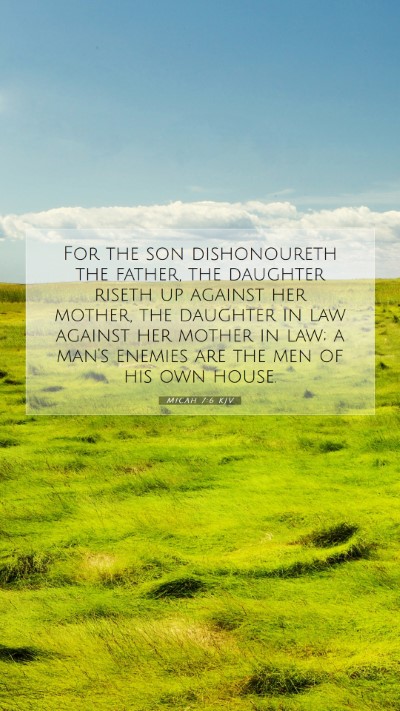Old Testament
Genesis Exodus Leviticus Numbers Deuteronomy Joshua Judges Ruth 1 Samuel 2 Samuel 1 Kings 2 Kings 1 Chronicles 2 Chronicles Ezra Nehemiah Esther Job Psalms Proverbs Ecclesiastes Song of Solomon Isaiah Jeremiah Lamentations Ezekiel Daniel Hosea Joel Amos Obadiah Jonah Micah Nahum Habakkuk Zephaniah Haggai Zechariah MalachiMicah 7:6 Meaning
What is the meaning of Micah 7:6?
For the son dishonoureth the father, the daughter riseth up against her mother, the daughter in law against her mother in law; a man's enemies are the men of his own house.
Micah 7:6 Bible Verse Meaning
Exploring Micah 7:6: Bible Verse Meaning and Commentary
Micah 7:6 states: "For the son dishonoreth the father, the daughter riseth up against her mother, the daughter-in-law against her mother-in-law; a man's enemies are the men of his own house."
Overview and Context
This verse is part of a larger prophetic declaration concerning the moral decay in Israel during Micah's time. It reflects the deep societal divisions and familial strife that characterize the period.
Commentary Insights
This passage from Micah has been examined in-depth by various commentators, each providing unique insights that aid in understanding the Scripture's implications.
-
Matthew Henry's Commentary:
Henry insists that the breakdown of familial relationships symbolizes a larger societal breakdown. He highlights the tragic irony that peace and loyalty, which ought to exist within families, are replaced by conflict and betrayal. This deterioration is not just a social issue but also speaks to the spiritual decline of the nation.
-
Albert Barnes' Notes:
Barnes provides an interpretation emphasizing the fulfillment of prophetic warnings. He explains that the disintegration of family ties serves as a manifestation of moral decay wherein individuals prioritize their interests over familial loyalty, reinforcing the grim reality of that era.
-
Adam Clarke's Commentary:
Clarke expands on the familial references, suggesting that this tension often arises due to differing values and beliefs, particularly in a society straying from divine guidance. He implies that such internal strife is indicative of a deeper rejection of spiritual authority and truth.
Thematic Significance
Micah 7:6 holds a mirror to the societal norms during a time of judgment and highlights the chaos stemming from ethical decay. Through the lens of this verse, we can derive several key themes:
- Familial Conflict: This verse puts a spotlight on how moral corruption can lead to familial division, a theme recurrent throughout Scripture.
- Societal Decay: The larger societal breakdown is encapsulated in personal relationships, emphasizing that individual sins contribute to communal consequences.
- Prophetic Warning: The emphasis on betrayal serves as a prophetic warning which urges readers to heed the call for repentance and restoration.
Application of the Verse
Understanding this verse has implications for modern readers. It serves as a cautionary tale about the importance of maintaining integrity and loyalty within families and communities, promoting unity rather than division.
As we reflect on Micah 7:6, we may ask ourselves:
- How do we uphold our values in the face of societal pressures?
- How can we foster unity within our relationships, especially when facing conflicting ideologies?
Cross References
For a more comprehensive understanding, consider the following related scriptures:
- Matthew 10:36: "And a man's foes shall be they of his own household." – This reinforces the theme of intra-family strife.
- Luke 12:53: "The father shall be divided against the son, and the son against the father..." – Similar sentiments about division and conflict are echoed here.
- Micah 1:5: Offers insight into the sins of Israel leading to these familial conflicts.
Conclusion
In summary, Micah 7:6 warns us against the spiritual and societal ramifications of turning away from God. The analysis provided through various public domain commentaries helps deepen our Bible verse understanding and enrich our Bible study insights. This verse is not just a reflection of ancient society but a timeless reminder of the need for unity, loyalty, and adherence to spiritual truths.


